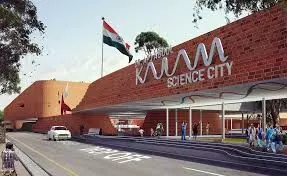Dr. APJ Abdul Kalam Science City Nears Completion, Boosts Science Education in Bihar
Bihar's Science, Technology, and Technical Education Department Outlines Major Achievements and Future Goals at PEST Conference;

The construction of the Dr. APJ Abdul Kalam Science City in Saidpur, Patna, is nearing completion, with 80% of its critical structural work already finished. Aimed at sparking interest in science among students and showcasing real-world applications of scientific theories, the Science City is set to become a major hub for learning and innovation in Bihar. The progress of this ambitious project was revealed during the PEST-Conference, organized by the Department of Science, Technology, and Technical Education in Patna.
Addressing the conference, officials highlighted the importance of Dr. APJ Abdul Kalam Science City in generating scientific curiosity among students and the general public alike. The Science City is part of Bihar’s broader efforts to enhance the state’s technical and educational infrastructure, complementing other major initiatives aimed at modernizing education.
Expanding Educational Infrastructure Under Saat Nischay
The Bihar government’s flagship Saat Nischay programs have been pivotal in transforming the state's technical education landscape. Under Saat Nischay-1, the "Avasar Badhe Aage Padhe" initiative has seen the establishment of 38 government engineering colleges and 46 government polytechnic institutes across Bihar’s 38 districts. Most of these institutions are now fully operational in their own campuses, while others, such as Government Polytechnic Barh, are nearing completion.
For the academic year 2024-25, Bihar’s technical institutions have expanded enrollment, with over 14,000 seats available for undergraduate students in government engineering colleges and more than 17,000 in polytechnic institutes. The state also reserves one-third of the seats in B.Tech and M.Tech courses for female students, ensuring greater participation of women in technical education.
Investment in Advanced Learning Facilities
The government has allocated substantial funds to improve technical education quality across engineering and polytechnic institutions. In the 2023-24 and 2024-25 financial years, ₹277.84 crore has been approved for engineering colleges and ₹184.91 crore for polytechnic institutes to establish cutting-edge laboratories, workshops, libraries, and smart classrooms.
Additionally, ₹47.15 crore has been allocated over two years to provide high-speed Wi-Fi and internet connectivity across these institutions. Training programs have also been launched for faculty members, with around 300 teachers receiving instruction in the latest pedagogical methods through IIT Roorkee.
Centers of Excellence in Emerging Technologies
In collaboration with IIT Patna, the government has established high-level Centers of Excellence in emerging technologies such as electric vehicles, artificial intelligence, robotics, and drone technology across all government polytechnic institutes. These centers are designed to align Bihar's education system with industry demands and prepare a skilled workforce for the future. The first phase of this initiative has seen an investment of ₹97 crore, with another ₹122.86 crore earmarked for the second phase, which will focus on transformer construction, repair, and optical fiber technologies.
Employment and Teacher Appointments
In the past two years, the government has made significant strides in faculty appointments across engineering and polytechnic institutions, filling 1,458 posts in engineering colleges and 727 in polytechnics. The recruitment process also benefits from a 35% horizontal reservation for women, resulting in the appointment of 398 women in engineering colleges and 261 in polytechnic institutes.
Furthermore, students enrolled in Bihar’s technical institutions are benefiting from placement opportunities, with over 8,000 students securing jobs in prestigious companies during the 2023-24 academic session.
Modernized Learning and Extracurricular Activities
The Bihar government is also prioritizing student engagement and holistic development. Biometric attendance has been made compulsory for both students and faculty, ensuring accountability and regularity. Additionally, competitive sports and extracurricular events are organized regularly, with financial support from the state for divisional and state-level competitions.
The modernization of Patna’s planetarium and the establishment of science centers in Gaya and Darbhanga further underscore the state’s commitment to fostering interest in science and astronomy among students and the general public.
Vision for the Future
The Bihar government’s aggressive investment in education and infrastructure reflects its long-term vision for quality technical education in the state. With initiatives like the construction of an engineering university in Mithapur, Patna, and the operationalization of Centers of Excellence, Bihar is positioning itself as a future leader in the fields of science and technology education.
As Bihar continues to expand and modernize its educational landscape, the near-completion of Dr. APJ Abdul Kalam Science City marks a significant step toward inspiring future generations of scientists, engineers, and innovators.
The PEST-Conference was attended by several key officials, including Secretary Dr. Pratima, Director Udayan Mishra, and Project Director Anant Kumar, along with other department representatives. The event showcased Bihar's commitment to enhancing educational opportunities and nurturing a skilled, future-ready workforce.

